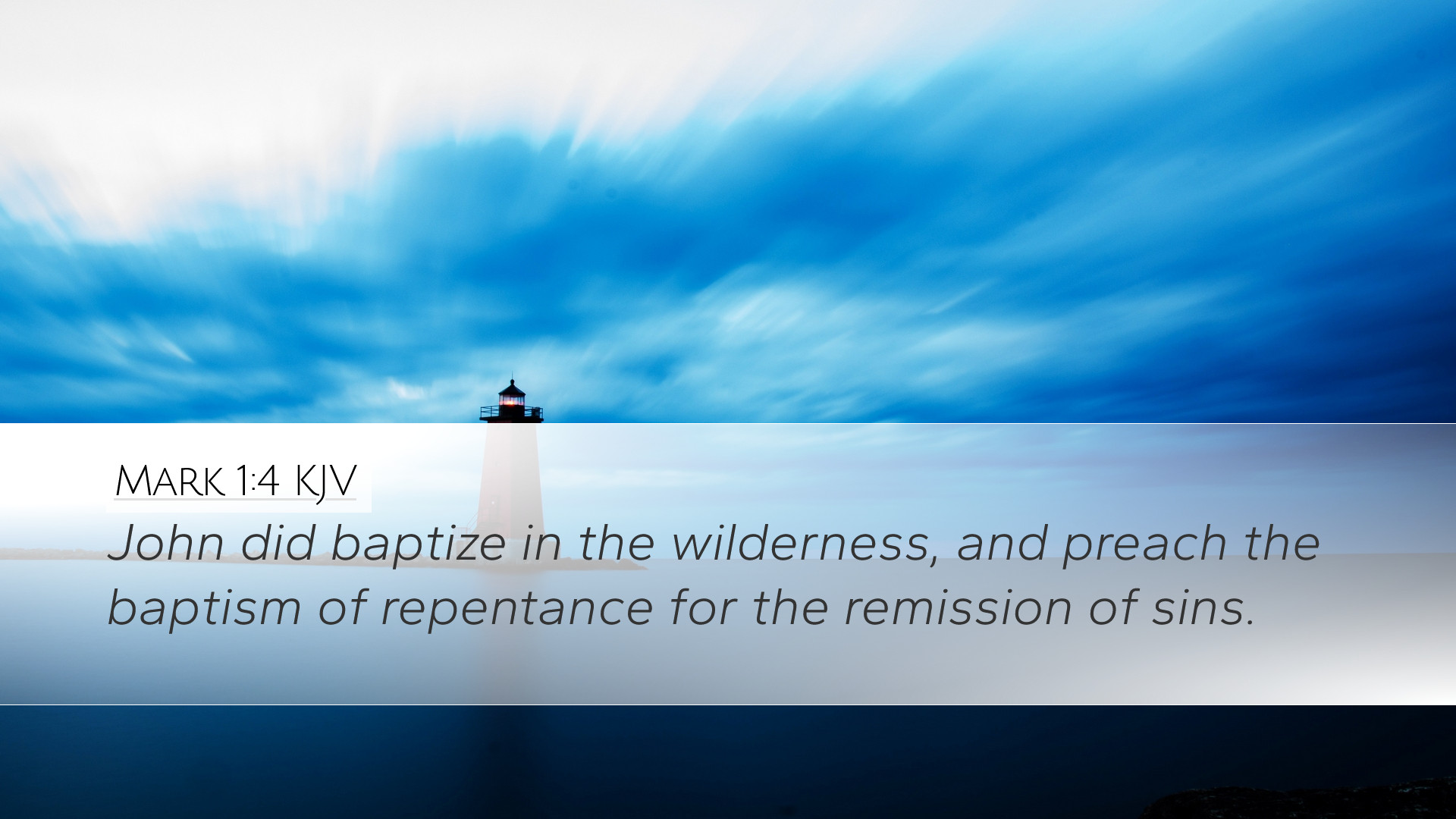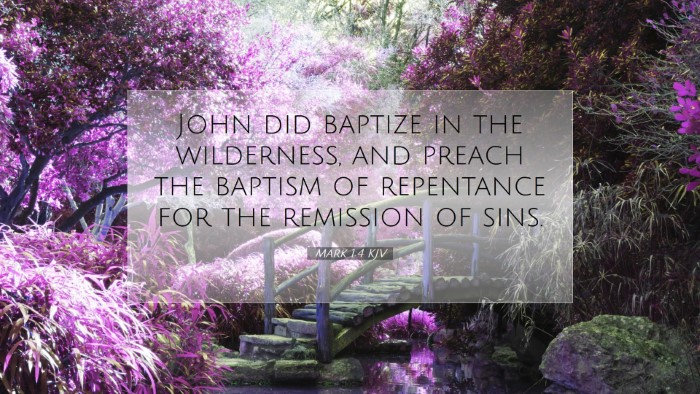Commentary on Mark 1:4
Mark 1:4 states: "John did baptize in the wilderness, and preach the baptism of repentance for the remission of sins." This succinct yet profound verse encapsulates the ministry of John the Baptist, highlighting his role as the forerunner to Christ. Below, insights from respected public domain commentators provide a deeper understanding of this important passage.
Context and Background
Mark’s gospel opens with an emphasis on the preparation for Jesus's ministry, which is famously heralded by John the Baptist. The context of Mark 1:4 is crucial as it sets the stage for the coming of the Messiah, and indicates the transitional nature of John's ministry in relation to the Old and New Covenants.
John the Baptist's Role
- Matthew Henry: Henry notes that John was a "voice crying in the wilderness," emphasizing that his ministry took place in a desolate area, symbolizing a spiritual barrenness among the people. This reflects the need for a call to repentance.
- Albert Barnes: Barnes highlights that John’s baptism was characterized as a baptism of repentance, indicating that it was a preparatory act to help people acknowledge their sins and understand their need for forgiveness, thus paving the way for Christ.
- Adam Clarke: Clarke expands on the concept of wilderness, suggesting it signifies the separation from worldly distractions, allowing individuals to confront their sins privately and profoundly. This aspect of John's ministry invited people to a deeper spiritual reflection.
The Nature of the Baptism
This verse mentions the "baptism of repentance for the remission of sins," a significant theological point:
- Matthew Henry: He explains that repentance is essential for the spiritual life, noting that true repentance involves a change of heart, which leads to a change in behavior. John's baptism symbolizes this transformation in preparation for the coming of Christ.
- Albert Barnes: Barnes points out that baptism in this context represents an outward sign of an inward change. The emphasis on “remission of sins” indicates that John’s ministry was not merely ritualistic but combative against sin, pushing for a thorough cleansing of one’s life.
- Adam Clarke: Clarke asserts that remission speaks of forgiveness that is contingent upon a repentant heart, implying that the act of baptism itself does not save but rather signifies an important spiritual awakening and commitment to follow God’s path.
The Theological Implications
Mark 1:4 is rich with theological implications for understanding the entirety of the Gospel message:
- Matthew Henry: Henry remarks on the necessity of preparing for the coming of the Lord. Repentance, as preached by John, is not merely a doctrine but a life-altering experience that directly affects one's relationship with God.
- Albert Barnes: He reflects on how this verse serves as a bridge to convey the nature of the New Covenant. John’s role highlights that Jesus came to bring a new understanding of repentance and forgiveness fulfilled through His own life and sacrifice.
- Adam Clarke: Clarke connects this preparatory work by John to the broader narrative of redemption, noting that John’s ministry clarifies the need for Christ’s atoning work, emphasizing that John was essential in leading people towards faith in the future Savior.
Application for the Modern Believer
In light of this commentary, several applications emerge for contemporary believers, particularly pastors and theologians:
- Encouragement of Repentance: Understanding the importance of repentance as foundational to the Christian walk, believers should continually assess their lives in alignment with God's standards.
- Preparation for Christ's Return: Much like John, Christians are called to prepare themselves and others for the second coming of Christ, sharing the message of repentance and grace alongside the anticipatory hope of His return.
- Living a Life of Reflection: The wilderness metaphor extends to modern believers, urging them to find solitude and moments away from the world's distractions to seek God genuinely.
Conclusion
Mark 1:4 serves not only as an introduction to the Gospel but also as a vital call to the church today. The collective insights from Matthew Henry, Albert Barnes, and Adam Clarke encourage a deeper exploration of what it means to embrace a lifestyle of repentance and prepare for Christ. Through understanding John's ministry, believers are challenged to reflect on their own spiritual journeys and the impact of their witness in a world that desperately needs hope and redemption.


